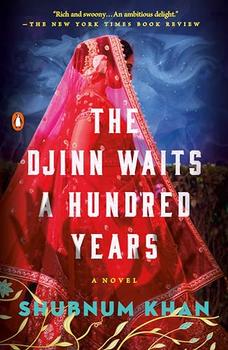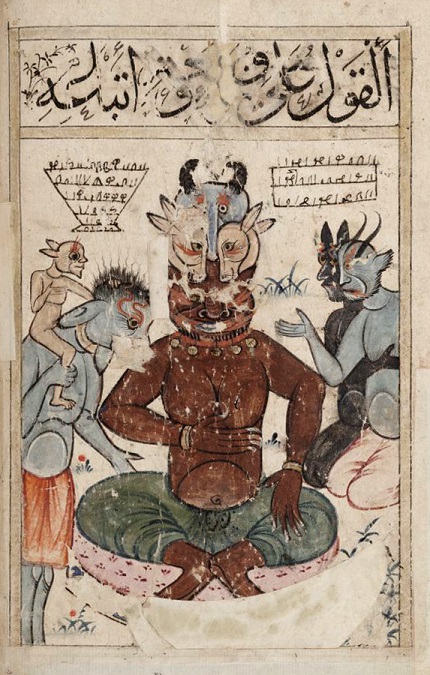Summary | Excerpt | Reading Guide | Reviews | Beyond the book | Read-Alikes | Genres & Themes | Author Bio

A Novel
by Shubnum Khan"A dark and heady dream of a book" (Alix E. Harrow) about a ruined mansion by the sea, the djinn that haunts it, and a curious girl who unearths the tragedy that happened there a hundred years previous
Akbar Manzil was once a grand estate off the coast of South Africa. Nearly a century later, it stands in ruins: an isolated boardinghouse for eclectic misfits, seeking solely to disappear into the mansion's dark corridors. Except for Sana. Unlike the others, she is curious and questioning and finds herself irresistibly drawn to the history of the mansion: To the eerie and forgotten East Wing, home to a clutter of broken and abandoned objects—and to the door at its end, locked for decades.
Behind the door is a bedroom frozen in time and a worn diary that whispers of a dark past: the long-forgotten story of a young woman named Meena, who died there tragically a hundred years ago. Watching Sana from the room's shadows is a besotted, grieving djinn, an invisible spirit who has haunted the mansion since her mysterious death. Obsessed with Meena's story, and unaware of the creature that follows her, Sana digs into the past like fingers into a wound, dredging up old and terrible secrets that will change the lives of everyone living and dead at Akbar Manzil. Sublime, heart-wrenching, and lyrically stunning, The Djinn Waits a Hundred Years is a haunting, a love story, and a mystery, all twined beautifully into one young girl's search for belonging.
Hauntings are at the heart of this beautifully written and constructed novel. Both Akbar Manzil and Sana are haunted: the house by the djinn who loved and lost, and Sana by another ghost; though Sana's supernatural encounters are depicted in so skillful and ambiguous a way that her haunting could just as easily be real or a product of her own imagination and guilt. A tantalizing slow burn at first, the plot is superbly paced. Tension builds as the book travels back and forth through time, unveiling events as Sana pieces together what she can of the mystery and heightening anticipation for further revelations. An exquisite, lyrical, heart-rending tale of love and loss, estrangement and belonging; and an enthralling mystery spanning a century of history and heritage — just like the djinn itself, who waits a hundred years...continued
Full Review
 (622 words)
(622 words)
(Reviewed by Jo-Anne Blanco).
 In Shubnum Khan's debut novel The Djinn Waits a Hundred Years, set amidst the Indian diaspora of South Africa, fifteen-year-old Sana and her father move into a dilapidated house by the sea that is haunted by a djinn. The djinn is the link between past and present, a connection between the 21st-century tenants and the immigrant family who lived there in the early 1930s. This mythic spirit serves as a manifestation of the Islamic history and culture brought to South Africa by the Muslim Indian émigrés — an unseen witness to their past and present lives.
In Shubnum Khan's debut novel The Djinn Waits a Hundred Years, set amidst the Indian diaspora of South Africa, fifteen-year-old Sana and her father move into a dilapidated house by the sea that is haunted by a djinn. The djinn is the link between past and present, a connection between the 21st-century tenants and the immigrant family who lived there in the early 1930s. This mythic spirit serves as a manifestation of the Islamic history and culture brought to South Africa by the Muslim Indian émigrés — an unseen witness to their past and present lives.
In her CrimeReads essay, "Decolonizing the Gothic," Khan writes of her family history and the stories told by her grandfather, who emigrated to South Africa in 1935. Among ...

If you liked The Djinn Waits a Hundred Years, try these:

by Anuradha Roy
Published 2023
From the critically acclaimed, Booker Prize-nominated author of Sleeping on Jupiter and All the Lives We Never Lived, an incisive and moving novel about the struggle for creative achievement in a world consumed by growing fanaticism and political upheaval.

by Sindya Bhanoo
Published 2023
These intimate stories of South Indian immigrants and the families they left behind center women's lives and ask how women both claim and surrender power - a stunning debut collection from an O. Henry Prize winner.